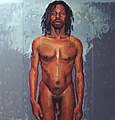Ndị Afụrịka ǹkè Amerịka
Ọdịdị
(Dupụ̀rụ̀ sì Ndi Afrika nke Amerika)
Ndi Afrika nke Amerika
| obere ụdị nke | Americans, Black people, African diaspora in the Americas |
|---|---|
| Akụkụ nke | Americans |
| akara ala | African American |
| Asụsụ obodo | American English, African American Vernacular English |
| okpukpere chi/echiche ụwa | Protestantism, Catholicism, Okpukpere Alakụba |
| mba/obodo | Njikota Obodo Amerika |
| mba osi | Eluàlà |
| diaspora | African diaspora |
| akụkọ ihe mere eme nke isiokwu | African American history |
| female form of label | afroamericana, Afroameričkany |
| has list | list of African-Americans |


African American, ma ha na kpo ha Black American, bu oke ana mata ndi oji bi n'Njikota Obodo Amerika, m'obu nde nne na nna ha biara na afo gara-aga, amuo ha ebe a, ma o bụ ndi nwẹtẹrẹ akwukwo obịbị na Amerika.
Na oge gara-aga, ndi oji bi n'Amerikạ bu ndi ohu ndi ocha gbatara n'Afrika kpobata ha n'Amerikạ. A kwusiri hena mgbe ndi govumenti (Ochichi) Amerikạ deghariri Iwu-ala ha (Constitution) nke ugboro Iri na-ato Thirteenth Ammendment na Constitution.
Ndi afrika nke amerikạ mádu jùrù ya nke 42,020,743 (2010; census).[1]
Lee nke ozo
Links n'aga n'ezi
| Wikimedia Commons nwe ru media dị ikwu nye Ndi Afrika nke Amerika. |
- The Changing Definition of African-American, Smithonian Magazine, February 2010, looked up on 16 March 2016.
- February is African American History Month, The Library of Congress, looked up on 16 March 2016.
References
<references>
Gallery
-
1963 Civil Rights March on Washington, D.C.
-
African american registration mark
-
Curlee from Nebraska. Oil on canvas, 84" x 84", by Matthew Cherry, 2008.
-
Liberia TRC Public Hearings Opening Ceremonies, 2008.
-
Karen Alexander with cigarette.
-
Obama-Biden supporter during San Francisco LoveFest 2008.
-
The futere First Family waves: Obamafamily 2007.
-
The 1960 Olympic ID of Otis Davis, who won two gold medals for record-breaking performances in both the 400 metres and 4x400 metres relay at the 1960 Summer Olympics. In addition to setting a new world record of 44.9 seconds, Davis' victory in the 400 metre event made him the first man to break the heralded 45-second barrier.
-
Condoleezza Rice was the first female African-American secretary of state, as well as the second African American secretary of state (after Colin Powell), and the second female secretary of state (after Madeleine Albright).
-
Helon Habila n'ụlọ. n'afọ 2009. Ọ bụ onye so dee, bi na Centrevill, Fairfax, Végíníyà.
- ↑ The Black Population: 2010: Ndi afrika nke amerikạ mádu na Njikota Obodo Amerika, by Sonya Rastogi, Tallese D. Johnson, Elizabeth M. Hoeffel, and Malcolm P. Drewery, Jr., United States Census Bureau, looked up on 17 March 2016.









